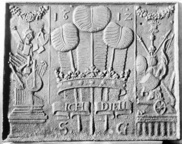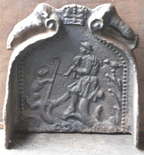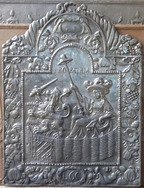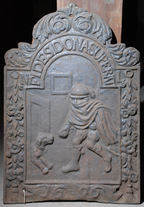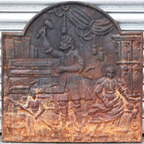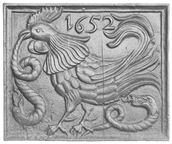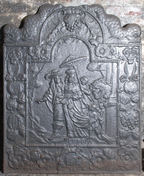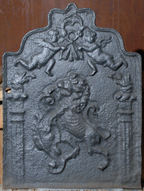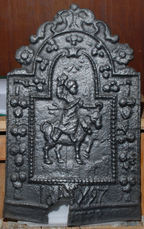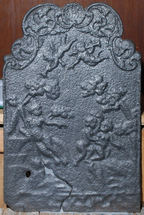-
1291
Description: Rectangular shape; astragal with cavetto-moulded edging; decoration in three vertical sections each divided by a fillet; central section: three ostrich feathers within a coronet and a motto scroll - ICH DIEN (I serve); at the top, the date split either side of the uppermost feather; at the bottom, initials - SG - split either side of the quills; left panel: on a pedestal, an arrangement of musical and scientific instruments and books below a floral swag with a central rose; right panel: on a palisade, a triumph of martial arms - cannon, drum, shield, spear, flag etc. - beneath a floral swag and handful of arrows.
Notes: The three ostrich feathers within a coronet and the motto, Ich Dien, are the badge of the Prince of Wales. Probably a fireback in honour of Henry Frederick, Prince of Wales, oldest son and heir of King James VI of Scotland, I of England, with the date added to commemorate his death in 1612. The initials are likely to be those of the pattern maker.
Inscription: 16 12 / ICH DIEN / S G
- Decoration tags:
- rectangular (shape)
- astragal with cavetto (edging)
- whole carved pattern
- individual numbers
- heraldic
- pictorial
- historical
- architectural
- royal
- text
- objects
Manufactured: in 1612 in the Eifel area of Germany.
Current location: not known.
Museum number: RBA 37533 (part of the Ahrgau-Museum, Ahrweiler museum group)
- Attached to series:
- Prince of Wales firebacks
- Miscellaneous royal firebacks
-
1128
Description: Quasi-arched shape with forward-facing 'wings', which splay outwards towards the base; the 'wings' curve to follow the shape of the main panel but curl outwards at the top; central panel with pictorial image of, to the right, a shepherd holding a musical pipe, his right foot upon a log, upon which a dog, to the left, sits holding the shepherd's crook; top centre, a crown, on either side of which, on the curled upper parts of the 'wings', is an inward facing sheep.
Notes: Nothing is known about the sources of free-standing firebacks or what prompted their production. Their form is similar but the predominant use of horticultural or arboreal decorative themes, which suggests production within a limited time frame, has in this instance been replaced with a humorous scene. Only a very small number of such castings are known. Depth 210mm
- Decoration tags:
- free-standing (shape)
- none (edging)
- whole carved pattern
- heraldic
- pictorial
- animals
- humans
- plants
- objects
Manufactured: in the late-17th to early-18th century in England.
Current location: not known.
- Attached to series:
- Free-standing firebacks
-
1212
Description: Arched rectangular central panel with bead edging; wickerwork Garden of Holland (Hollandse Tuin) within which is seated a berobed female figure holding a cap of freedom on the end of a long pole; before her is the crowned heraldic lion of the States General of the Netherlands, clutching a sheaf of arrows in its left front paw; above are the words, Pro Patria; arched rectangular border with fillet edging; central cartouche at top, with festoons of fruit, flowers and leaves suspended on each side from ribbons supported by rings; at the bottom, swirled ribbon around an oval compartment bearing the inscription 'L6C'; on top, a central cartouche from which descend a cornucopia on each side of the arch.
Notes: An overtly patriotic theme with symbols of Dutch nationhood; the inscription at the bottom indicates the style of border; other firebacks with the same inscription have the same border; similar inscriptions (e.g. L7C and L8G) indicate different borders.
Inscription: PRO PATRIA / L6C
- Decoration tags:
- 'Dutch' (shape)
- fillet (edging)
- whole carved pattern
- pictorial
- allegorical
- text
- animals
- humans
- plants
- objects
Manufactured: in the late-17th century in the Siegerland area of Germany.
Current location: not known.
- Attached to series:
- 'Dutch' LC/G series
- 'Dutch' Garden of Holland firebacks
-
844
Description: Arched rectangular central panel; fillet edging; pictorial scene of a cloaked figure, to the right, tempting a dog, to the left, with a tasty morsel; behind are the outlines of a door and window; arched rectangular border with fillet edging, the date along the bottom; down each side, a floral festoon; over the arch, the inscription, the initials split between each side of the main inscription; on top, floral scrolls.
Notes: The inscription translates as 'loyalty above gifts'; some castings omit the initials, NL, indicating that they were a subsequent addition. The illustration is derived from 'The thief and the dog', one of a series of engravings of Aesop's Fables by Wenceslaus Hollar.
Copies of this fireback are known.
Inscription: N / FIDES DONA SUPERAT / L // 1696
- Decoration tags:
- 'Dutch' (shape)
- fillet (edging)
- whole carved pattern
- individual letters
- planklines
- pictorial
- allegorical
- text
- animals
- humans
Manufactured: in 1696 possibly in the Siegerland area of Germany.
Current location: English Heritage Store, Atcham Business Park, Atcham, Shropshire, England.
Museum number: EH ASC 4491 (part of the English Heritage museum group)
- Attached to series:
- 'Dutch' 1696 NL series
-
1269
Description: Arched rectangular shape; fillet edging; central male figure clothed in 17th century style, facing to the left, holding a mallet in his raised right hand and holding a board with rectangular detailing in relief in his left hand; vertical boards in relief behind; below to the left, a smaller figure holding a long pole diagonally with other detailing in relief behind; to the lower right, a female figure, contemporaneously clothed, a scroll feature to her right; behind, an archtectural grille with scrolled detailing; above, swagged drapery with three descending tasselled ropes.
Notes: A pastiche of a 17th century fireback. The scene appears to be of a carpenter's workshop but some of the detail in the lower parts of the fireback is indistinct owing to corrosion. The drapery was probably inspired by a similar feature on several late-17th or early-18th century 'Dutch'-style fireback designs. The reverse (upcast) side of the fireback is very smooth indicating a modern date for the casting.
- Decoration tags:
- rectangular with round arch (shape)
- fillet (edging)
- whole carved pattern
- pictorial
- humans
- objects
Manufactured: in the 20th century in France.
Current location: Raflees Reclamation Ltd, Trefusis Lodge, Tone Green, Bradford-on-Tone, Somerset, England.
- Attached to series:
- Miscellaneous pattern firebacks
-
651
Description: Rectangular; cavetto edging; a left-facing cockerel grasps a snake in its beak, another snake writhes on the ground behind it; date to left of the cockerel’s tail; four vertical planklines.
Notes: The design may have religious significance, the snake symbolising sin and the cockerel denoting St Peter’s denial of Christ. The ‘1’ of the date is hooked, suggesting a common source with firebacks designed by the pattern-maker, IM. A copy of this fireback is set into the brickwork of 16 Old Church Street, Chelsea, London.
Copies of this fireback are known.
Inscription: 1652
- Decoration tags:
- rectangular (shape)
- cavetto (edging)
- whole carved pattern
- planklines
- pictorial
- biblical
- text
- animals
Manufactured: in 1652 possibly at Brede Furnace in the Weald area of England.
Current location: not known.
- Attached to series:
- Small cavetto series
- Hooked '1' series
- New Testament firebacks
- Brede group
-
219
Description: Arched rectangular central panel with bead on fillet edging, pictorial representation of a man and woman walking, behind the woman a child holds her train and a young person carries a parasol; from behind a column on the right, a horse's head is visible, a tree stands to the left, at the foot of the scene is the word 'EUROPA'; arched rectangular border with fillet edging, from a central bunch of grapes at the top of the arch, a ribbon on each side suspends bunches of fruit and flowers; at the bottom a central cartouche containing the inscription 'L7G', with flowers on each side;; on top are two mirrored dolphins.
Notes: The pictorial scene is based on an engraving c.1642 of Friedrich Wilhelm, Elector of Brandenburg, and his wife, Luise Henriette of Oranje-Nassau, by Mathias Czwiczek; one of series of firebacks depicting allegories of the four continents; the initials, L7C, denote the style of border - other firebacks having the same inscription have the same border - and other borders are denoted by similar inscriptions (e.g. L6C and L8G).
Copies of this fireback are known.
Inscription: EVROPA / L7C
Manufactured: in the mid- to late-17th century in the Siegerland area of Germany.
Current location: Preston Manor, Brighton, East Sussex, England.
Museum number: HA105000 (part of the Brighton Museum museum group)
- Attached to series:
- 'Dutch' LC/G series
- 'Dutch' Continents firebacks
-
210
Description: Quasi-arched rectangular shape; ovolo-moulded edging; fluid curving, double ovolo arch with a pair of putti holding looped ribbons; a lion rampant holding a cartouche, between two pilasters, each surmounted by a dragon’s head.
Notes: A simple decorative device has replaced the customary allegorical or classical scene.
Copies of this fireback are known.
- Decoration tags:
- rectangular with ornate arch (shape)
- ovolo (edging)
- whole carved pattern
- pictorial
- animals
Manufactured: in the late-17th century in England.
Current location: Brighton Museum and Art Gallery, Brighton, East Sussex, England.
Museum number: HA105020 (part of the Brighton Museum museum group)
- Attached to series:
- Late pictorial series (all)
- Late pictorial series 5
-
212
Description: Arched rectangular central panel, bead edging, female figure, her right arm raised, sitting on a bull; arched rectangular border, fillet edging, swags of fruit bunches suspended from ribbon, inscription below central panel; on top, symmetrical floral swirls and flowers; plain panel at bottom.
Notes: The image is of Europa being carried away to Crete by Zeus disguised as a bull.
Copies of this fireback are known.
Inscription: 16 NDW 97
- Decoration tags:
- 'Dutch' (shape)
- fillet (edging)
- whole carved pattern
- pictorial
- mythological
- monogram
- text
- animals
- humans
Manufactured: in 1697 in the Siegerland area of Germany.
Current location: Brighton Museum and Art Gallery, Brighton, East Sussex, England.
Museum number: HA105015 (part of the Brighton Museum museum group)
- Attached to series:
- 'Dutch' NDW series
-
214
Description: Rectangular with arched, mirrored scrolls on top and central scallop shell; fillet edging; in a grove with two putti above, blowing trumpets, to the left, a naked female figure seated against a table, pointing at three children to the right, on a rock; at the bottom, narrow panel with indistinct decoration.
Notes: The scene is probably from classical mythology, but has not been identified.
Copies of this fireback are known.
- Decoration tags:
- rectangular with ornate arch (shape)
- fillet (edging)
- whole carved pattern
- pictorial
- mythological
- humans
- plants
Manufactured: in the early-18th century in England.
Current location: Brighton Museum and Art Gallery, Brighton, East Sussex, England.
Museum number: HATMP002269 (part of the Brighton Museum museum group)
- Attached to series:
- Late pictorial series (all)
- Late pictorial series 2
